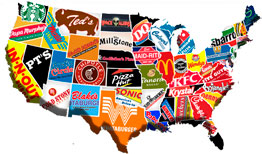 An Omaha, Nebraska, Wendy's franchise owner is joining the list of restaurants vowing to cut worker hours rather than have them qualify for employer-provided health coverage under Obamacare. That's endangering the livelihoods of around 100 workers who are having their hours cut (managers, of course, are remaining full-time):
An Omaha, Nebraska, Wendy's franchise owner is joining the list of restaurants vowing to cut worker hours rather than have them qualify for employer-provided health coverage under Obamacare. That's endangering the livelihoods of around 100 workers who are having their hours cut (managers, of course, are remaining full-time):
The company has announced that all non-management positions will have their hours reduced to 28 a week. Gary Burdette, Vice President of Operations for the local franchise, says the cuts are coming because the new Affordable Health Care Act requires employers to offer health insurance to employees working 32-38 hours a week. Under the current law they are not considered full time and that as a small business owner, he can't afford to stay in operation and pay for everyone's health insurance. There are 11 Wendy's restaurants in the metro. “It has a huge effect on me and pretty much everybody that I work with,” says [hourly worker T.J.] Growbeck, who understands the reasoning and says other part-timers at other fast-food restaurants are facing the same problem. “I'm hoping that I can get some sort of promotion because then I would get my hours, but everybody is shooting for that because of the hours being cut.”
This Wendy's owner has apparently not learned the lesson of Olive Garden and Red Lobster parent company Darden Restaurants, Papa John's, or the Denny's franchise owner who made similar plans, only to have Darden's profits drop 37 percent in the wake of those threats, Papa John's suffer in a brand reputation survey, and the CEO of Denny's tell the franchise owner to quit making the chain look bad. And all of these threats to workers' livelihoods are coming over what would be tiny increases if the costs were passed directly to customers. When Papa John's CEO John Schnatter was trying to really scare people, he said his chain would pass along a 10 to 14 cent increase in the cost of a pizza—less than $22 a year if you ate Papa John's three times every single week. But when Forbes' Caleb Melby did the math on Schnatter's claims, it worked out to less than 5 cents per pizza. Mind you, all of the wailing these chain executives and franchise owners do about how they can't afford health care is suspect to begin with. But when they're not willing to contemplate even the smallest price increases rather than cutting already poorly paid workers down below 30 hours a week and risking what's now been shown to be significant public relations costs, that's a clear statement that this isn't some kind of pure, rational business decision. It's an ideological stance against anything that might benefit the low-wage workers on whom the fast food industry relies.








Leave a comment